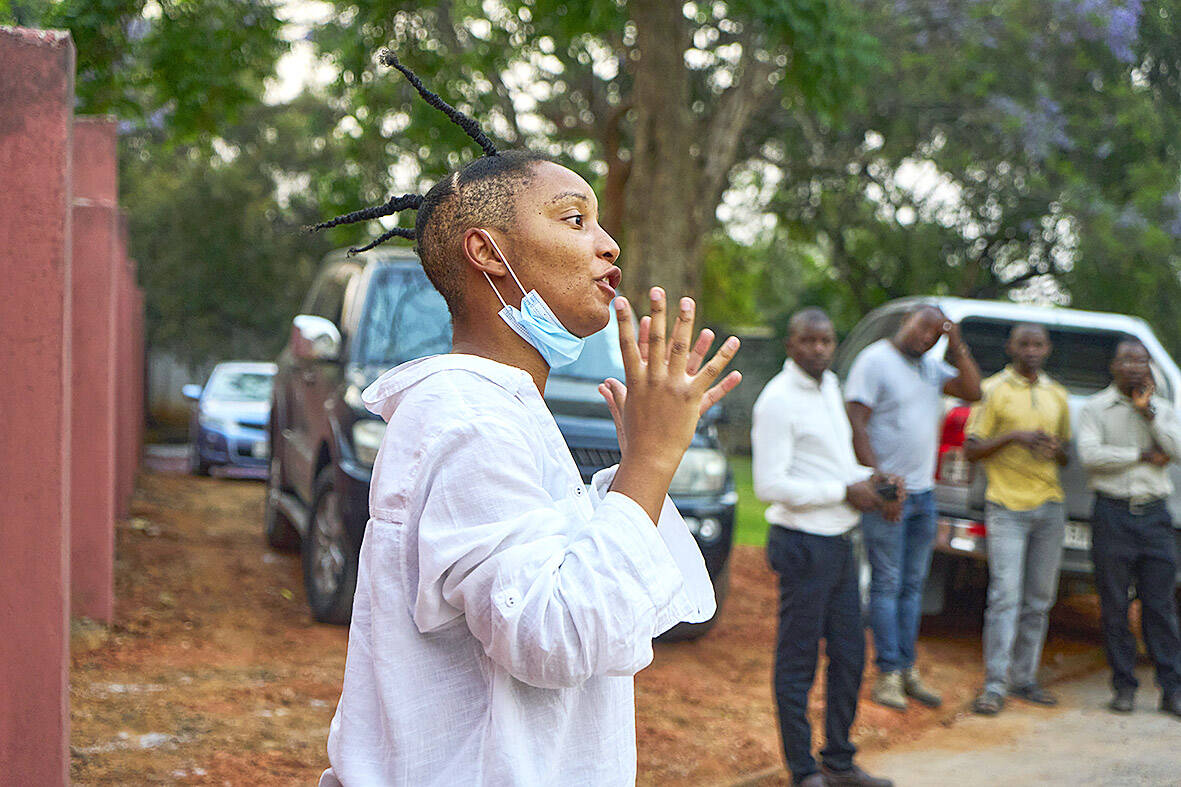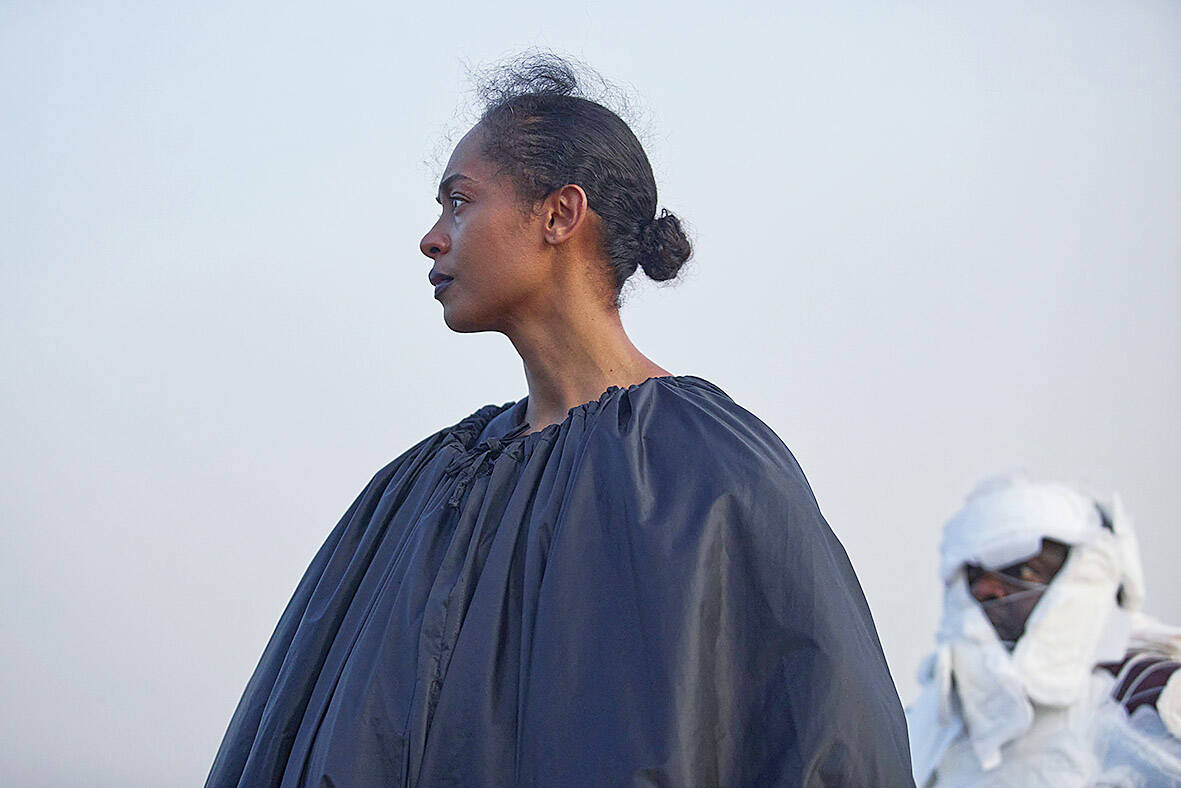Shula is driving home from a fancy dress party one night when she encounters an unusual sight in the middle of a country road: her Uncle Fred’s dead body.
But Shula, portrayed by Susan Chardy, does not behave in a way that we would expect. She doesn’t cry out in horror or appear the least bit upset or shocked by the sight. Instead, we sit there with her in silence, her in sunglasses and a silver helmeted mask adorned with sparkling rhinestones. Shula looks straight out of a music video as she stares off into the distance. This, we realize quickly, is going to be a thing. At the very least, it’s an inconvenience, ripping her out of her independent life and back into the throes of her traditional family, their patriarchal ways and all their crippling secrets.
This is the opening scene of On Becoming a Guinea Fowl, Rungano Nyoni’s darkly comedic, stylish and hauntingly bizarre portrait of a Zambian family funeral. It is perhaps the first great film of this year. It premiered last year at the Cannes Film Festival and has already had a run in the UK.

Photo: AP
And it’s a post-Oscars treat to have something this great in the cinemas to shake audiences out of their end-of-the-road awards contender boredom. What better way to do it than with something so different, so vibrant and so unforgettable as On Becoming a Guinea Fowl, only the second feature from the self-taught filmmaker.
Nyoni centers this story around a dayslong funeral for this predominately Bemba family. Shula is in the middle of the generations involved, a reluctant but obedient participant in the rituals of the elders. The women organize all the things, make all the food, and then serve all the men who are sitting around doing nothing. Eventually, they’ll all gather for a climactic, distressing scene in which they divide up Fred’s assets and place blame for his death. It is, like everything else, deeply unfair and misogynistic, coming down to whomever shouts loudest.
The elder women cry and wail and are cruel to Uncle Fred’s widow for not taking care of him. But there is an open secret that’s bubbling up to the surface now that Fred is dead: He was a predator and a pedophile whose abuse of the young women in his family stretches back decades. This is, most of the elders agree, something that should just be forgotten and buried along with Fred.

Photo: AP
“Do you want me to dig up the corpse and ask it what happened?” Shula’s dad asks when she confronts him with the truth.
This is a society that remains bound to protecting the reputation and memory of a man whose actions continue to affect the women he violated: His wife; his young niece; Shula’s grown, often drunk cousin (Elizabeth Chisela). The women are just supposed to compartmentalize and move on — something the matriarchs seem largely on board with.
Shula reads one of her auntie’s words, presumably for an obituary: “You were not just a brother, but also a father figure. … Ever jovial and joyous. A person who was fair.”

Photo: AP
Done in quick succession with her young cousin Bupe’s confession that she too was a victim of the deceased, words like “father figure” and “jovial” echo with malice.
On Becoming a Guinea Fowl shares some spiritual DNA with Women Talking, in which mothers pass on traumas and secrets and the cycle goes on, despite even the best of intentions. Nyoni and her cinematographer David Gallego make this a transportive, stylish and unforgettable experience that powerfully transcends the specifics of its setting, while also taking audiences into an culture that’s likely unfamiliar.
The ending is not what one might call conclusive, but perhaps a litmus test for the individual viewer as to whether or not they’ll exit with hope or dread for what’s to come. And regardless, when you take a step back, Guinea Fowl cements the exciting arrival of a true filmmaker.

Photo: AP

The Lee (李) family migrated to Taiwan in trickles many decades ago. Born in Myanmar, they are ethnically Chinese and their first language is Yunnanese, from China’s Yunnan Province. Today, they run a cozy little restaurant in Taipei’s student stomping ground, near National Taiwan University (NTU), serving up a daily pre-selected menu that pays homage to their blended Yunnan-Burmese heritage, where lemongrass and curry leaves sit beside century egg and pickled woodear mushrooms. Wu Yun (巫雲) is more akin to a family home that has set up tables and chairs and welcomed strangers to cozy up and share a meal

Dec. 8 to Dec. 14 Chang-Lee Te-ho (張李德和) had her father’s words etched into stone as her personal motto: “Even as a woman, you should master at least one art.” She went on to excel in seven — classical poetry, lyrical poetry, calligraphy, painting, music, chess and embroidery — and was also a respected educator, charity organizer and provincial assemblywoman. Among her many monikers was “Poetry Mother” (詩媽). While her father Lee Chao-yuan’s (李昭元) phrasing reflected the social norms of the 1890s, it was relatively progressive for the time. He personally taught Chang-Lee the Chinese classics until she entered public

Last week writer Wei Lingling (魏玲靈) unloaded a remarkably conventional pro-China column in the Wall Street Journal (“From Bush’s Rebuke to Trump’s Whisper: Navigating a Geopolitical Flashpoint,” Dec 2, 2025). Wei alleged that in a phone call, US President Donald Trump advised Japanese Prime Minister Sanae Takaichi not to provoke the People’s Republic of China (PRC) over Taiwan. Wei’s claim was categorically denied by Japanese government sources. Trump’s call to Takaichi, Wei said, was just like the moment in 2003 when former US president George Bush stood next to former Chinese premier Wen Jia-bao (溫家寶) and criticized former president Chen

President William Lai (賴清德) has proposed a NT$1.25 trillion (US$40 billion) special eight-year budget that intends to bolster Taiwan’s national defense, with a “T-Dome” plan to create “an unassailable Taiwan, safeguarded by innovation and technology” as its centerpiece. This is an interesting test for the Chinese Nationalist Party (KMT), and how they handle it will likely provide some answers as to where the party currently stands. Naturally, the Lai administration and his Democratic Progressive Party (DPP) are for it, as are the Americans. The Chinese Communist Party (CCP) is not. The interests and agendas of those three are clear, but